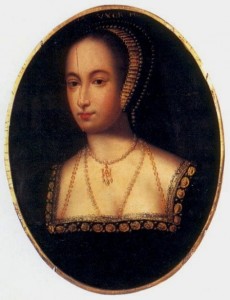 On 29th April 1536, Queen Anne Boleyn had two encounters with male courtiers which she later worried about when imprisoned in the Tower.
On 29th April 1536, Queen Anne Boleyn had two encounters with male courtiers which she later worried about when imprisoned in the Tower.
The first involved court musician Mark Smeaton and the second involved Sir Henry Norris, her husband’s Groom of the Stool and a man who was courting Anne’s cousin, Madge Shelton. Both were examples of courtly love, courtiers flattering their queen, but were twisted into something more in the coming days.
You can read more about these incidents in my article 29 April 1536 – A Sulk and an Argument and more about courtly love in my articles Courtly love, Flirtation and the Fall of Anne Boleyn – Part One and Courtly love, Flirtation and the Fall of Anne Boleyn – Part Two